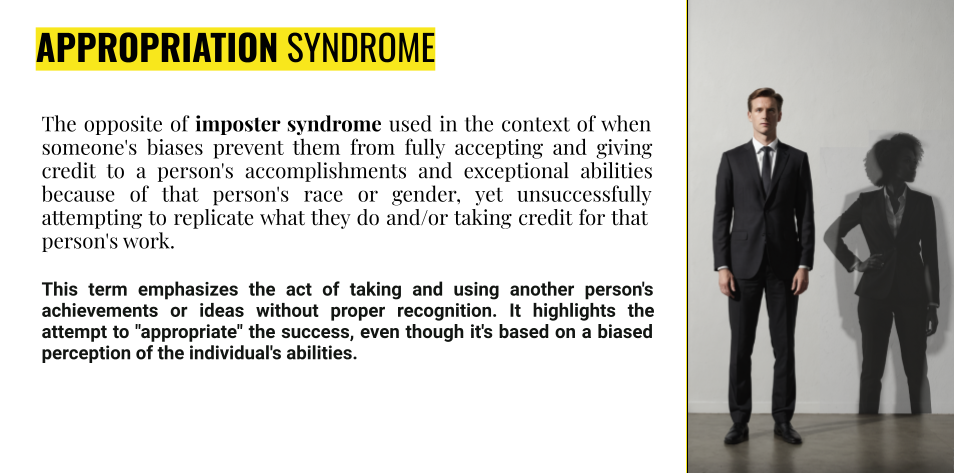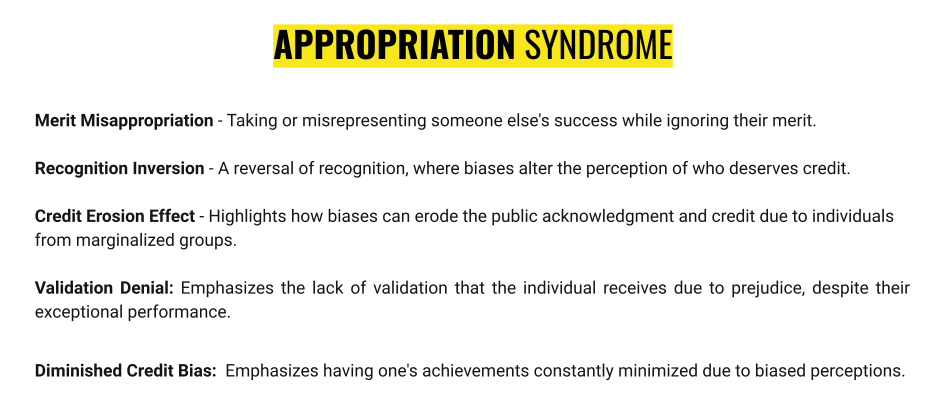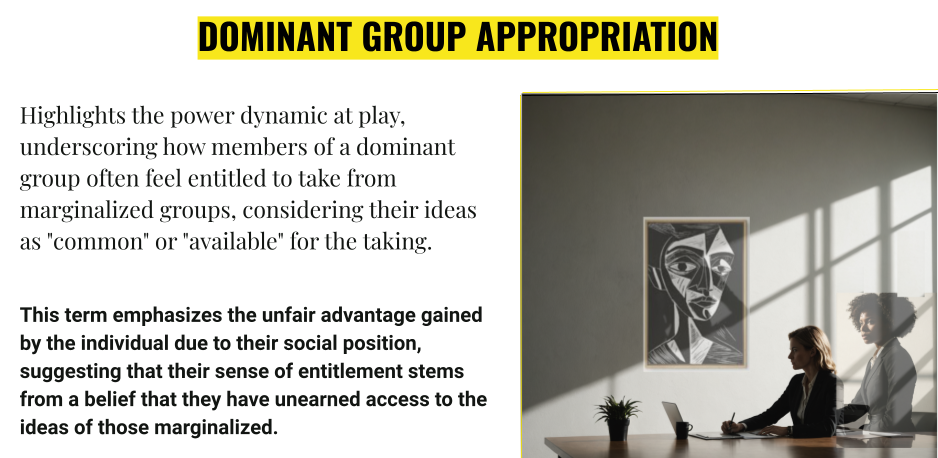Explore Appropriation Syndrome, its impact on marginalized groups, and strategies for fostering equity and inclusion in recognition and credit.
Overview of Appropriation Syndrome
Appropriation Syndrome refers to a recurring pattern where credit and success are misattributed, particularly impacting marginalized groups. For instance, in workplaces, an employee from a marginalized background may successfully lead a project, only to have a colleague from a dominant group receive recognition for it significantly affecting how achievements are acknowledged and valued within society. Tackling Appropriation Syndrome means creating spaces where everyone’s contributions are recognized and celebrated. By spotting and dealing with biases, we can open up fairer opportunities and representation for individuals from marginalized communities.

Understanding Appropriation Syndrome is essential for fostering inclusive practices that genuinely value diverse contributions. By recognizing how these biases manifest, organizations and individuals can actively work towards creating environments that promote equity and acknowledge all achievements, regardless of the background of the individual. Tackling Appropriation Syndrome is a crucial step in breaking down systemic injustices and creating a more inclusive society.

Understanding Merit Misappropriation
Merit Misappropriation is all about claiming or misrepresenting someone else’s success while ignoring their hard work and talent. You’ll often see this happening in workplaces where the achievements of marginalized individuals aren’t given the spotlight they deserve. For example, studies have shown that Black professionals frequently have their contributions diminished or entirely ignored, resulting in their talents being underutilized. This doesn’t just stall their career growth; it can also hit them hard psychologically, leading to lower self-esteem and feelings of isolation.
Research shows that people from marginalized backgrounds often get stuck with lesser roles or tasks, even when they have equal or better qualifications than their peers. This kind of Merit Misappropriation can have serious psychological effects, making individuals feel inadequate and less motivated. It’s a cycle that underscores the need for systemic changes to ensure equitable recognition in professional settings.
Recognition Inversion happens when the credit for ideas or contributions is flipped or reversed, causing confusion about who actually deserves recognition. This often means people from dominant groups get praised for ideas that originally came from marginalized individuals, leading to unequal opportunities for career growth. For example, if a white colleague gets all the accolades for a project mostly developed by a person of color, thereby perpetuating a cycle of inequity. This inversion not only affects personal recognition but also reinforces harmful stereotypes by suggesting marginalized individuals are less capable or deserving of acknowledgment. Research shows these biases can seriously impact career paths, keeping minority individuals from landing major projects or promotions. By recognizing and understanding Recognition Inversion, organizations can take steps to ensure that credit allocation is fair and that contributions are accurately acknowledged.
The Credit Erosion Effect highlights how biases can diminish public acknowledgment and recognition for contributions made by individuals from marginalized backgrounds. This erosion of credit can have far-reaching implications, leading to a lack of representation in leadership roles and on recognition platforms. For example, when contributions from people from diverse backgrounds are not celebrated, it perpetuates a cycle of exclusion that can leave marginalized individuals feeling undervalued and disconnected from their professional environments.
Research shows that when individuals from marginalized backgrounds aren’t properly recognized for their achievements, it can lead to decreased funding for the initiatives they lead or support. This Credit Erosion Effect reinforces systemic disparities, underscoring the importance of organizations taking active steps to recognize and celebrate everyone’s contributions. Doing so helps foster a more inclusive and supportive atmosphere.
Validation Denial refers to the lack of acknowledgment that marginalized individuals often face, despite their notable performance and contributions. This denial can lead to feelings of inadequacy and frustration, particularly as these individuals may feel their achievements are consistently overlooked. For instance, a talented woman of color may achieve significant results in her organization yet find that her contributions are seldom recognized, leading to self-doubt and feelings of being an imposter.
When validation is missing, it can hold back collaboration and innovation because people may hesitate to share their ideas if they think their input will be misattributed. This can lead to a toxic work environment where marginalized individuals pull back from teamwork, further continuing the cycle of exclusion. Understanding the effects of Validation Denial is crucial for building an environment where everyone feels empowered to contribute and share their ideas.
Diminished Credit Bias refers to the ongoing downplaying or overlooking of achievements by marginalized individuals. This bias is especially noticeable in academia, where minority scholars often fight for the same recognition as their peers. Even when their work is recognized, studies show that individuals from marginalized backgrounds often receive less praise than others. This unfairness can lead to fewer opportunities for mentorship and sponsorship, which then worsens existing inequalities in professional settings.
The impact of Diminished Credit Bias goes beyond individual experiences, affecting the overall representation of diverse voices in influential areas. When these biases go unchallenged, they can lead to a lack of diversity in leadership and decision-making roles within organizations. Addressing Diminished Credit Bias is vital for fostering an equitable environment where all contributions are valued and recognized.
Dominant Group Appropriation and Its Consequences
Dominant Group Appropriation happens when people from dominant groups take and use the ideas and accomplishments of marginalized groups without giving them proper credit.

This practice gives unfair advantages to the dominant groups and silences the voices of marginalized individuals.
Case Studies
Dior’s campaign for the Sauvage fragrance line faced accusations of appropriating Native American culture. This case exemplifies appropriation syndrome in the business world, where a dominant group appropriates elements of marginalized cultures for their own gain, disregarding the original culture’s significance.
Appropriation syndrome is prevalent in the art world, as seen in cases such as Wojnarowicz v. American Family Association and Cariou v. Prince. These cases involved legal battles highlighting the misappropriation of artistic works, where artists’ ideas were taken and used without proper recognition or permission. (Top 10 Cases on Appropriation Art and the Law)
Addressing Appropriation Syndrome
Addressing Appropriation Syndrome requires raising awareness about biases such as Merit Misappropriation and Recognition Inversion. Organizations and individuals can implement educational initiatives aimed at promoting understanding and sensitivity toward cultural ownership. For example, organizations can create formal policies that recognize contributions from diverse backgrounds, ensuring that all voices are valued within decision-making processes.
Encouraging open dialogues about biases and their impacts can foster a more inclusive environment where everyone feels empowered to share their experiences and contributions. By actively addressing these biases, society can work toward creating a culture of recognition and appreciation that uplifts marginalized voices.
Strategies for Promoting Equity and Inclusion

Encouraging collaborative efforts that highlight diverse perspectives can enhance innovation and creativity within organizations. To achieve collaborative success, however, environments where all individuals are recognized for their contributions must be fostered.
Robyn Charles
Society can work towards dismantling systemic inequities and promoting a more inclusive future. To counteract the effects of Appropriation Syndrome, environments that celebrate the contributions of all individuals must be cultivated. Acknowledging and addressing biases can lead to more equitable representation and opportunities for marginalized groups across various sectors.

Leave a Reply